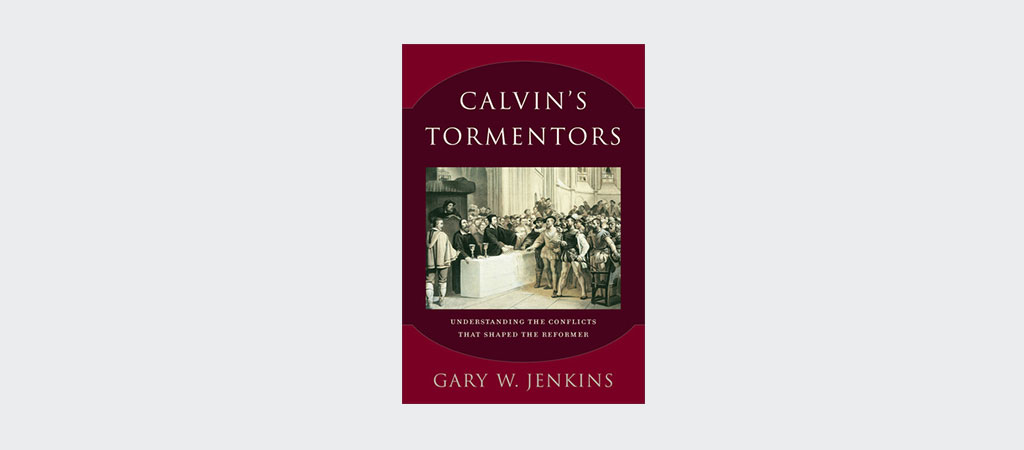Calvin was a great thinker, a great theologian and, by dint of these things, forced to be a leader. He was also a private man, a committed friend, a public figure and a gifted controversialist (although not always by choice). He operated out of deep conviction and principle and with a clear sense of vocation, mission and practical outcomes. By virtue of the times he lived in and the nature of his project, Calvin’s influence on those with whom he came into contact was rarely neutral or insignificant. It was given to many lesser men to navigate life serenely. It was not so given to Calvin.
Jenkins’ genius in this book is to show how Calvin’s life, thought and practice inevitably shaped, and were in turn shaped by, other forceful characters whose agreement, disagreement or opposition, at different times and to differing degrees, forced Calvin to rethink or restate his doctrine and churchmanship.
Jenkins (an Orthodox Christian whose path took him via Calvin to his current faith) is neither a friend nor an enemy of Calvin. His treatment, in separate chapters, of Calvin’s relationship with du Tillet, Caroli, Sadoleto, Servetus, Castellio, Berthelier, Baudouin, Bolsec, Westphal and the Italian antitrinitarians is for the most part even-handed and objective and allows the reader to reflect on Calvin’s thought as it progressed over time and in relation to the controversies of the day. As such, the book traverses such varied terrain as how to live faithfully in relation to an unfaithful church (du Tillet); how to communicate clearly on the Trinity (Caroli); why a humanist gloss on the Catholic tradition was unacceptable—to either side—(Sadoleto); how those turbulent times treated heresy and heretics and how Calvin was drawn into a controversy that has dogged him since (Servetus); how friendship and admiration can, through a sense of unreciprocated affection, spoil into bitter enmity with theological pretexts (Castellio); how the Enfants de Genève showed the practical impossibility (due to a badly articulated relationship between church and state?) of a ‘perfect school of Christ’ this side of the parousia (Berthelier); how theological disagreements and jealousy spill over into ad hominem arguments and filthy invective (Bolsec, who, due to his distaste for Calvin’s doctrine of predestination, was at the origin of the widely circulated and scurrilous slander of Calvin’s juvenile homosexuality and adult womanizing); how the Eucharistic debate remained an unresolved issue amongst the reformed and how Calvin misread the reformed landscape in its diverse, deeply rooted beliefs and practices (Westphal); and how the doctrines of justification, satisfaction, the Trinity and the person and work of Christ the mediator played out in Italy, Poland and Hungary, paving the way for Unitarian and Deistic tendencies inimical to Calvin’s thought, even if some of the protagonists used distortions of Calvin’s writings to divide and conquer the orthodox (the Italian antitrinitarians).
Rich in detail, thought-provoking, wittily observant, thoroughly researched and documented (with an extremely useful index of authors and subjects) this monograph is a fine piece of scholarship. It will undoubtedly prove to be of great utility to scholars and students. But beyond that, this is also a useful book for all practitioners and leaders to read.
Few of us will be called to have the scope and depth of ministry that Calvin had. But many of us, reading these pages, will have a sense of uncomfortable familiarity with the ways in which these controversies played out as studies in interpersonal relationships. The experience of seeing close friends, with whom ministry practices and priorities were closely shared and with whom many moments of deep affinity and affection were felt, turn their backs and walk away is alas not uncommon. It is, sadder still, also not as rare as it should be that these episodes be accompanied by vitriol, even if diluted by spiritualizing language. And often as we read these pages, we are left with a sense that there was nothing inevitable about some of the outcomes, or at least some of the fall-out from them. Du Tillet emerges as a warm, wise friend urging Calvin to reflect and to moderate his views or, failing that, the too-vehement expression of them. Socinus, at the other end of the book, is celebrated by all for his ‘courtly manners, his breadth and depth of culture, his frank and attractive character, crowned by irreproachable morals and a deep and sincere piety.’ Calvin does not always come out of the accounts Jenkins gives with as much credit. But here we need to be careful, at least on two counts. First, we must not read back into the 16th century the sensibilities of our times. And second, a book such as this is necessarily selective. And it could be argued (as Jenkins does indeed intimate) that, since Calvin’s focus and mission throughout his life was the reformed church in his native land, a fairer sampling of Calvin’s character and style could be gleaned, not so much from the controversies that swarmed in his wake, but in the relationships he developed with those pastors he trained and sent back to France. Reading Calvin’s letters to these faithful friends and fellow-workers shows us a different side to Calvin – if he comforted them, it is equally sure that they comforted him, and that Calvin’s comforters outnumbered his tormentors.
In the conclusion of the work, Jenkins summarizes and outlines his major thesis, namely that Calvin was an ‘ad hoc theologian’ and that this was the source of the torment he endured at the hands of this richly peopled work. What Jenkins means by this, it becomes clear, is not so much that Calvin’s theology was circumstantial but that Calvin was ‘untrained in theology’ (p. 174). This paves the way to the main criticism that Jenkins seems to have as regards Calvin – that he thought that ‘the only source material for theology was revelation, as if theology was nothing more than humanistic enterprises in textual analysis.’ (p. 175). Jenkins means this as a slight. For Calvin, it would have stood as a compliment, and a final justification in his dealings with his tormentors.
 Philip Moore
Philip Moore
European Director, Acts 29
